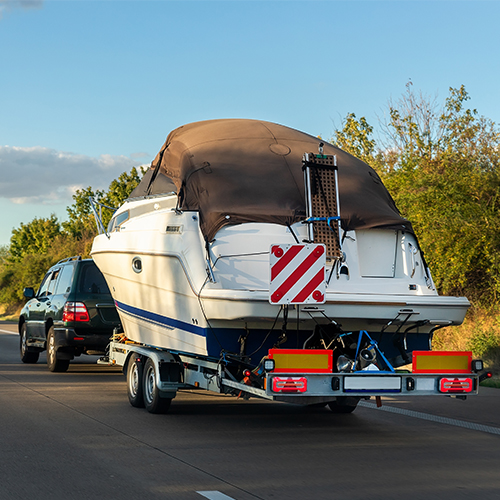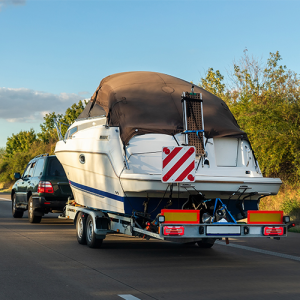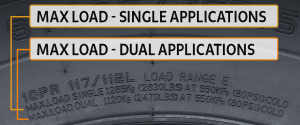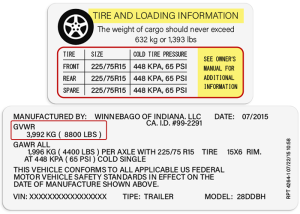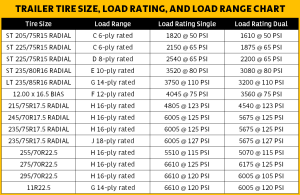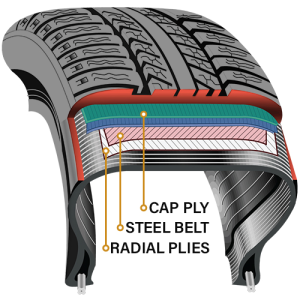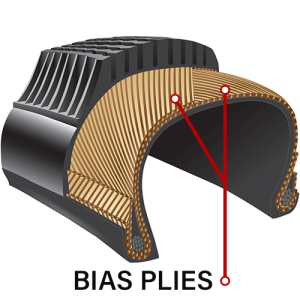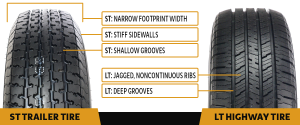“What are ST tires?” might flash through your mind when you see a weird tire size. These are different from car tires, as they are specifically manufactured for load handling.
ST tires are designed to be mounted on free-rolling axles, which do not need to provide steering and traction. This is the difference between trailer tire vs car tire sets.
But, which is the best trailer tire?
That answer greatly depends on your needs. An offroad trailer tire set is vastly distinct from camping trailer tires. Application, manufacturing country, speed and load ratings, construction, etc, are all important when looking for your next set!
Also, do you wish to purchase cheap trailer tires, made in USA or something else? Let’s go through everything you need to know about tires tires.
TRAILER TIRES BASED ON VEHICLE TYPE
Not all trailers are equal. Different cargo will require versatile trailer tires. Hauling livestock will require a smoother performance than dealing with construction materials. Their load and speed durability are also important for various cargo hauling.
So, the best travel trailer tires will greatly differ from any other tire set!
These are the important features you need to search for on the tire market.
BOAT TRAILER TIRES
Hauling boats need both durability and stability. These models perform in a similar manner to travel trailer tires and trailer owners will need to count for heavy-load capacity, minimized trailer swaying, and optimized driving stability. If the tires have these characteristics, they will be an excellent choice.
FIFTH-WHEEL AND TRAVEL TRAILER TIRES
Special trailer tires offer safer performance are necessary for travel and fifth-wheel trailers. These trailers require tires that offer stability, fuel efficiency, and reduced swaying. Shallow grooves and stable ribs optimize their surface contact, which decreases rolling resistance while boosting stability at the same time.
UTILITY TRAILER TIRES
Utility trailers or trailers hauling livestock need something smoother. Heat build-up and deformations are out of the question. You also do not want to experience tire blowouts when hauling animals or expensive equipment. Tires that keep cool and optimize their stability will work well for such trailers.
TRAILER TIRE RATINGS EXPLAINED
While all trailers need trailer tires, not all trailer tires are equal!
Like most tires, models belonging to this category are marked for load and speed durability, after the trailer tire size. These ratings determine their performance and durability throughout their performance.
TRAILER TIRE LOAD RANGES
Heavy-duty tires, including Special Trailer tires, have a load range rating. This is a letter that represents the load capacity each tire can carry without issues.
The most common are C, E, F, G, and D-rated trailer tires. However, more durable H and G-rated models also exist. These go alphabetically, where higher letters offer better load durability. Yet, do not forget about the load index of each tire, as this load range does not change their actual load handling power.
TRAILER TIRE SPEED RATING
Speed ratings note the max speed limit of a tire. While there are high speed trailer tire models available, most trailer tires will be rated for around 65 mph.
It is important that the speed limit of the tires is not exceeded. Driving faster will result in heat build-up that can lead to tire failure and blowouts. Trailer tire sizing will include the speed rating in order to ensure their driving safety. However, keep in mind, just because a trailer has a higher speed rating, does not necessarily mean that it can handle high speed performance.
THIS IS HOW YOU PICK THE RIGHT TRAILER TIRE LOAD RATING
Trailers carry cargo, that’s their primary function. Now, the type of load rating your trailer tires will need will greatly depend on their weight-carrying ability.
To put it in simpler terms: even if you get stronger tires that do not increase the trailer’s load capacity. For this reason, when looking for a new trailer tire set, it is crucial that the correct tires are purchased.
CHECKING YOUR TRAILER’S WEIGHT CAPACITY
Before you start looking for trailer tires, check the trailer’s GVWR, or Groos Vehicle Weight Rating. This is the weight limit of the trailer’s performing capability, including the weight of its cargo.
Therefore, the tires you purchase should be able to carry at least that much load!
Now, all tires (trailer or not) have load ratings. This is the maximum load capacity of 1 tire, which is often shown for both single and double applications on the tire sidewall. Just be sure to keep in mind that this number shows the absolute maximum load durability when the tires are at their max psi levels.
If these numbers are exceeded and you run the trailer overloaded, either the tires or the trailer’s axle will fail. So, it is best to keep it within safe limits.
RADIAL VS BIAS PLY TRAILER TIRES
Now, the debate still stands: bias vs radial trailer tires? Which one do you need?
The short answer is: it depends on the trailers’ applications.
Whether you need a bias or radial trailer set will be determined by multiple factors. These are speed, comfort, handling, load-carrying capacity, fuel economy, and tread life length. Depending on what your trailer needs, you will have to choose between bias or radial tires.
RADIAL TRAILER TIRES
Radial tires for trailer applications feature a structure that consists of plies added at 90-degree angles from bead to bead. These reinforce the tire under loads and help maximize its heat resistance. Furthermore, they provide the tire with a wider footprint.
The advantages of radial trailer tire sets:
- Damage resistance for your trailer = radial tires on trailer
- Smoother and often quiet performance
- Better fuel efficiency with decreased rolling resistance
- Lengthened usability with their wider footprint
- Minimized trailer swaying
BIAS TRAILER TIRES
Bias tires feature diagonally placed plies in their construction. This creates thicker sidewalls and narrow footprints, that are perfect for larger loads. The sidewalls also offer better damage resistance, ensuring their secure performance.
The advantages of bias-ply trailer tires:
- Able to support heavy loads
- They have a lower price point compared to radials
- Good for straight-line driving when handling loads
For more information about radial vs. bias tires, visit our blog post!
HOW CAN HEAVY DUTY TRAILER TIRES HOLD BIG LOADS?
Their load-carrying capacity is one of the most important characteristics of versatile trailer tires. The best choice trailer models feature thick sidewalls that can handle the weight of their cargo without problems.
But, how can you know which is the right trailer model for your specific trailer? What should trailer owners look at when purchasing heavy-duty tires?
What you purchase for your trailer will greatly depend on what your cargo is. Camper trailer tires will not perform the same as boat trailer models. So, what are the best trailer tires for heavy-load applications? Well, if you are on the market for durable trailer tires that can handle big loads, look for these characteristics:
THICK SIDEWALL
Trailer tire construction places more focus on the sidewall structure. These are thicker and sturdier. These sidewalls are able to withstand the high trailer tire psi levels necessary to securely perform under larger loads.
DAMAGE-RESISTANT STRUCTURE
Road hazards can easily damage tires that are not prepared for it. However, thanks to the reinforced construction, stiff shoulder pattern, and damage-resistant compound, trailer tires provide protection against damage. This is even more prevalent with off-road trailer tires, which face even more abuse during their applications.
IMPROVED HANDLING
Higher trailer tire air pressure levels, stable footprints, and durable structures also work together to optimize its handling. They guarantee surface contact, which offers a safer towing experience. Furthermore, these manufacturing characteristics help prevent trailer swaying, which can tip trailers over in no time.
Important: you should always follow trailer tire speed ratings! Exceeding the speed limit can result in serious consequences, even with high speed trailer tires.
TRAILER TIRES VS CAR TIRES, WHAT’S THE DIFFERENCE?
Have you even wondered why mounting an ST tire on your car is a bad idea?
Well, we are here to explain why you should definitely NOT to that!
The main difference between trailer tires and car tires, and what causes the biggest issue, is their internal structure. Even if both sets are radial tires, their other components will differ.
Trailer tires for sale are manufactured specifically for free-rolling axles. They are able to provide only the minimal necessary traction and grip, as the towing vehicle’s tires are responsible for traction. Additionally, the driving pressure affecting car trailer tires is vastly different from LT tires. ST trailer tires are only able to handle the heat and load pressure on free-rolling axle applications.
The same does for load range E trailer tires and those with bigger or smaller load durabilities. No matter if we talk camper tires, small trailer tires, RV trailer tires, or larger models, they should never be mounted on light trucks.
On the other hand, car tires are optimized to withstand the weight and driving pressure of towing vehicles. They provide both the traction and handling stability needed to optimize driving safety.
Read more about trailer tire vs car tire discussion at Priority Tire!
FAQS
HOW LONG DO TRAILER TIRES LAST?
How long trailer tires last depends on how much they are used yearly. If the tires are in use for less than 5,000 miles/year, dry rot will get to them sooner than their tread wears out. These are good for about 5-6 years. However, trailers with more use than this will need tire changes more frequently.
WHAT DOES ST MEAN ON TIRES?
ST on trailer tires stands for Special Trailer. These two letters indicate that the tires should only be mounted on trailers. Their internal structure differs from that of LT tires, therefore, ST tires for trailers cannot be used on light trucks. These models are optimized for free-rolling axle applications.
WHAT ARE THE BEST TIRES FOR TOWING A TRAVEL TRAILER?
To pull a travel trailer, without sacrificing traction and tread wear, the tires you mount on the towing vehicle need to be able to withstand the pressure placed on them. The best tires for towing travel trailers provide traction, handling, and durability – they are preferably 10-ply tire models.
SHOULD TRAILER TIRES BE INFLATED TO MAX PSI?
Yes, trailer tires need to be inflated to their maximum psi when they are cold. This is in order to ensure their full load-carrying capacity and to minimize heat build-up – reducing tread wear and fuel efficiency. What trailer tire pressure should be is represented on the tire’s sidewall.

